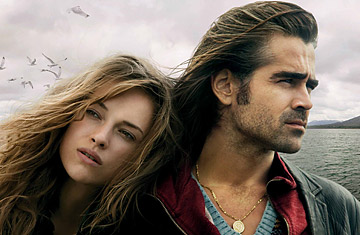
Alicja Bachleda and Colin Farrell in Ondine
Like John Sayles' The Secret of Roan Inish, Neil Jordan's intoxicatingly beautiful Ondine plays off the marvelous folklore of the selkie, a seal who sheds his or her skin temporarily and can live on land as a human. They usually stay earthbound long enough to make some mortal fall hopelessly in love with them (you never hear anything about ugly selkies) before putting on their seal coat again and slipping back into the sea. Jordan (Mona Lisa, The Crying Game) directed and wrote the screenplay, which is part mystery — can we believe in this magical realism? — and part human redemption tale for an unlucky fisherman named Syracuse (Colin Farrell).
Raising his nets from the chilly seas near Cork one day, Syracuse discovers he's caught a stunningly beautiful, half-drowned woman (Alicja Bachleda). She coughs up gutfuls of salt water, says she remembers nothing of who she is and asks him to call her Ondine, referencing the tale of the water spirit who "came from the water" as did she. She neither confirms nor denies that she's a selkie. Like Tom Hanks in Splash before him, Syracuse feels protective of the sea creature, or whatever she is, and honors her desire for secrecy, privacy and maybe a pretty dress or two.
Syracuse's urge to believe in the selkie myth is rooted in the misery of his own existence. His nickname is Circus — a reference to his clownish behavior when drunk — and even though he's been sober two years, seven months and a few days, the name lingers. His old lover, a barfly named Maura (Dervla Kirwan) has a new boyfriend, a vaguely threatening lout named Alex (Tony Curran). Despite her alcoholism, Maura has full custody of her young daughter with Syracuse, Annie (Alison Barry), who is suffering from kidney failure. In the manner of all tragically ill cinematic children, Annie is spunky and imaginative (she's instantly convinced that Ondine is a selkie) — but Barry is such a relaxed and strong performer that she manages to shrug off the burden of Annie's precociousness.
There's a sad little moment where Annie calls her father Circus, and we get our first and only glimpse of a stern Syracuse. "That's not my name," he tells her. But the rebuke is also a plea, one we want her to understand and respect. This is a man whose only friend is the local priest (Stephen Rea, a regular for Jordan). Particularly around Maura, Syracuse is like a whipped dog. He needs something to change his luck.
The part is tailor made for Farrell, one of those natural talents whose career seemed, after a promising start (Tigerland) to seriously derail with a series of lame studio pictures (S.W.A.T., Alexander, Miami Vice). Then there was his public dexterity with expletives — it was almost awe inspiring to watch him on Letterman — his sex tape and some much-discussed substance abuse. He appeared headed for ruin.
Flash forward a few years and Farrell, like Syracuse, is sober and a father to a young child with special needs. (Six-year-old James, his son with ex-girlfriend Kim Bordenave, suffers from a rare neuro-genetic disorder; he and Bachleda also had a baby of their own this past fall.) As an actor, Farrell also seems back on firm ground. He was fantastic in the prettiest bloodbath of 2008, In Bruges, and in 2009's Crazy Heart. His work as Syracuse is understated to the point that some may find it unremarkable — but it's a beautifully confident performance, an irony given that he constructs his portrayal of Syracuse around the concept of humility. Syracuse is a man humbled by his peers, who mock him, and by his own recovery; he has seen his true, worst self and been leveled by the experience.
Just the way Sayles seduced us with Roan Inish, Jordan makes you want to believe in the fairy tale. The difference is that Ondine seems, from the beginning, less likely to end happily ever after — we feel the threats of the real world intruding, in the form of bitter, drunken Maura and the dark-eyed, dangerous stranger asking around town about Ondine. Finally, there is the matter of Ondine's undies. She seems awfully at home in skimpy lingerie for a seal. We know this because there are many shots of Bachleda (who played the Polish girl lured into sex slavery in Trade) dressing and undressing.
The actress is ravishing, especially as artfully shot by cinematographer Christopher Doyle, but it's too much, a distraction. I'm not sure Jordan required his female lead to act; it's more like he told her to report for beauty duty. When Susan Lynch played a selkie in Roan Inish, she was otherworldly, like some crazy, albeit gorgeous, water witch. Bachleda is too distinctly of this world. Emerging from Syracuse's net in a loosely knit sweater, she appears to be wearing a couture version of the net itself. When she's flapping around Syracuse's charmingly rustic cabin in a man's overcoat, an oversized shirt and galoshes, you half expect Anthropologie catalog copy to scroll across the bottom, giving the SKU for "Irish Dream Overshirt, $118." It feels ungrateful to complain that a movie is too beautiful, but in its best and thankfully, most prevalent parts, Ondine has created such a longing for magic that these reminders of retail fantasy feel like a true intrusion.
